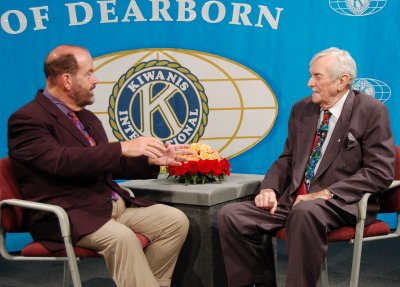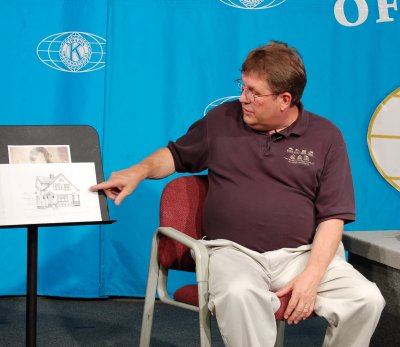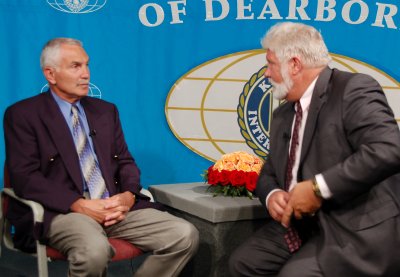Welcome to the KiwaniTalk Information Site
About KiwaniTalk
KiwaniTalk is a public information program produced by the Kiwanis Club of Dearborn. Every week KiwaniTalk is shown on Comcast Cable, channel 25, in Dearborn, Michigan, and in 28 other communities in the immediate area. The show is broadcast each week at 7:00 pm on Tuesday and 9:00 pm on Thursday.
June Shows
 This month, Dearborn city council president John B. "Jack" O'Reilly, Jr. came to Kiwanitalk. O'Reilly, an active man, discussed Camp Dearborn and the Montgomery Ward building among other things. In regard to Camp Dearborn and other city services as well, O'Reilly stressed the need to be responsive to the market. He also brought up an interesting metric in connection to Montgomery Ward's; he felt the area merchants and the city as a whole would benefit from a user with at least a 5 mile "pull". The tenent in line for occupancy before the city intervened had a far smalle "pull" radius. In particular, Mr. O'Reilly has not given up hope of attracting a minor league basebal franchise to the property.
This month, Dearborn city council president John B. "Jack" O'Reilly, Jr. came to Kiwanitalk. O'Reilly, an active man, discussed Camp Dearborn and the Montgomery Ward building among other things. In regard to Camp Dearborn and other city services as well, O'Reilly stressed the need to be responsive to the market. He also brought up an interesting metric in connection to Montgomery Ward's; he felt the area merchants and the city as a whole would benefit from a user with at least a 5 mile "pull". The tenent in line for occupancy before the city intervened had a far smalle "pull" radius. In particular, Mr. O'Reilly has not given up hope of attracting a minor league basebal franchise to the property.
 An interesting presentation on an aspect of Dearborn history and community life came to the KiwaniTalk studios in the person of Mike Assenmacher. Mr. Assenmacher, brother of Kiwanian Jerry Assenmacher, is past president of the Ford Homes Historic District and was quite informative on the origins and the architecture of FHHD. Mr. Assenmacher brought in sketches of the seven house designs from the 1919-20 housing projected spearheaded by Henry Ford. He mentioned, for example, one of the first homes was bought by Henry Ford's dance instructor, the man for whom Levett Hall (at the Henry Ford Museum) is named.
An interesting presentation on an aspect of Dearborn history and community life came to the KiwaniTalk studios in the person of Mike Assenmacher. Mr. Assenmacher, brother of Kiwanian Jerry Assenmacher, is past president of the Ford Homes Historic District and was quite informative on the origins and the architecture of FHHD. Mr. Assenmacher brought in sketches of the seven house designs from the 1919-20 housing projected spearheaded by Henry Ford. He mentioned, for example, one of the first homes was bought by Henry Ford's dance instructor, the man for whom Levett Hall (at the Henry Ford Museum) is named.
 Judge Hultgren of Dearborn's 19th District Court gave an interview to Gary Gardner at KiwaniTalk. Judge Hultgren and Mr. Gardner ran against each other (over 10 years ago) for the position the judge now occupies. Mr. Gardner, a lawyer, practices before Judge Hultgren and the two had a lively, friendly conversation. In a moment of candor, the judge recalled being on the receiving of corporal punishment in elementary school--this while reminiscing how the interpretation of assult laws has changed in his experience. The Judge Hultgren also discussed some of the issues he considers before sending a man (or woman) to jail. Tangentially, he explained how jail overcrowding reduces the jail time of nonviolent offenders.
Judge Hultgren of Dearborn's 19th District Court gave an interview to Gary Gardner at KiwaniTalk. Judge Hultgren and Mr. Gardner ran against each other (over 10 years ago) for the position the judge now occupies. Mr. Gardner, a lawyer, practices before Judge Hultgren and the two had a lively, friendly conversation. In a moment of candor, the judge recalled being on the receiving of corporal punishment in elementary school--this while reminiscing how the interpretation of assult laws has changed in his experience. The Judge Hultgren also discussed some of the issues he considers before sending a man (or woman) to jail. Tangentially, he explained how jail overcrowding reduces the jail time of nonviolent offenders.
Contact us
We would like to hear from you. Please e-mail us at letters@kiwanitalk.org.
Site sponsor: Strait City Trading Company, an internet store for braided stretch belts.
 This month, Dearborn city council president John B. "Jack" O'Reilly, Jr. came to Kiwanitalk. O'Reilly, an active man, discussed Camp Dearborn and the Montgomery Ward building among other things. In regard to Camp Dearborn and other city services as well, O'Reilly stressed the need to be responsive to the market. He also brought up an interesting metric in connection to Montgomery Ward's; he felt the area merchants and the city as a whole would benefit from a user with at least a 5 mile "pull". The tenent in line for occupancy before the city intervened had a far smalle "pull" radius. In particular, Mr. O'Reilly has not given up hope of attracting a minor league basebal franchise to the property.
This month, Dearborn city council president John B. "Jack" O'Reilly, Jr. came to Kiwanitalk. O'Reilly, an active man, discussed Camp Dearborn and the Montgomery Ward building among other things. In regard to Camp Dearborn and other city services as well, O'Reilly stressed the need to be responsive to the market. He also brought up an interesting metric in connection to Montgomery Ward's; he felt the area merchants and the city as a whole would benefit from a user with at least a 5 mile "pull". The tenent in line for occupancy before the city intervened had a far smalle "pull" radius. In particular, Mr. O'Reilly has not given up hope of attracting a minor league basebal franchise to the property.
 An interesting presentation on an aspect of Dearborn history and community life came to the KiwaniTalk studios in the person of Mike Assenmacher. Mr. Assenmacher, brother of Kiwanian Jerry Assenmacher, is past president of the Ford Homes Historic District and was quite informative on the origins and the architecture of FHHD. Mr. Assenmacher brought in sketches of the seven house designs from the 1919-20 housing projected spearheaded by Henry Ford. He mentioned, for example, one of the first homes was bought by Henry Ford's dance instructor, the man for whom Levett Hall (at the Henry Ford Museum) is named.
An interesting presentation on an aspect of Dearborn history and community life came to the KiwaniTalk studios in the person of Mike Assenmacher. Mr. Assenmacher, brother of Kiwanian Jerry Assenmacher, is past president of the Ford Homes Historic District and was quite informative on the origins and the architecture of FHHD. Mr. Assenmacher brought in sketches of the seven house designs from the 1919-20 housing projected spearheaded by Henry Ford. He mentioned, for example, one of the first homes was bought by Henry Ford's dance instructor, the man for whom Levett Hall (at the Henry Ford Museum) is named.
 Judge Hultgren of Dearborn's 19th District Court gave an interview to Gary Gardner at KiwaniTalk. Judge Hultgren and Mr. Gardner ran against each other (over 10 years ago) for the position the judge now occupies. Mr. Gardner, a lawyer, practices before Judge Hultgren and the two had a lively, friendly conversation. In a moment of candor, the judge recalled being on the receiving of corporal punishment in elementary school--this while reminiscing how the interpretation of assult laws has changed in his experience. The Judge Hultgren also discussed some of the issues he considers before sending a man (or woman) to jail. Tangentially, he explained how jail overcrowding reduces the jail time of nonviolent offenders.
Judge Hultgren of Dearborn's 19th District Court gave an interview to Gary Gardner at KiwaniTalk. Judge Hultgren and Mr. Gardner ran against each other (over 10 years ago) for the position the judge now occupies. Mr. Gardner, a lawyer, practices before Judge Hultgren and the two had a lively, friendly conversation. In a moment of candor, the judge recalled being on the receiving of corporal punishment in elementary school--this while reminiscing how the interpretation of assult laws has changed in his experience. The Judge Hultgren also discussed some of the issues he considers before sending a man (or woman) to jail. Tangentially, he explained how jail overcrowding reduces the jail time of nonviolent offenders.